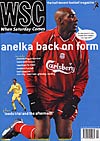 Martin Gambarotta takes a look at the growing debt in Argentinian league football and the AFA's initiatives to deal with it
Martin Gambarotta takes a look at the growing debt in Argentinian league football and the AFA's initiatives to deal with it
As a full-scale popular revolt was toppling the Argentinian president Fernando de la Rúa in December, a considerable number of people were kicking up a fuss about something else: tickets to see Racing Club’s bid to clinch its first league title in 35 years. The game was postponed because of the turmoil that left at least 27 dead, but eventually – with a new head of state in office and much cajoling – the game was played a week later. Racing won the title.
The championship came only a year after Racing had avoided bankruptcy as a social club. Only in October was the club formally turned into a business. A miracle? Not really. Racing were clinically dead when saved during 2000 by a special law passed by Congress. The rescue, which allowed fan and businessman Fernando Marín to step in, came after much lobbying by influential Racing fans, including the governor of Buenos Aires province, Carlos Ruckauf. The club is technically still trying to reschedule its US$60 million (£41 million) debt.
Racing claimed the trophy four days after the country’s new president, Adolfo Rodríguez Saá (who subsequently resigned after barely a week in office), announced Argentina could no longer service its $132 billion debt. Now Argentinian football is facing its own version of default. The daily Página/12 has estimated the league clubs’ combined debt at $350 million. Julio Grondona, the head of the AFA, declared: “If we carry on like this there won’t be any football in 2002.” In August, players went on strike for two weeks demanding $35 million owed in salaries. Most clubs cannot afford to pay for security and say they have been further crippled by the 21 per cent VAT slapped on tickets by the unpopular government which was kicked out in December 2001.
Local giants River Plate and Boca Juniors have a combined debt of nearly $100 million and cash is running short. Both clubs were paid $6 million in a sponsorship deal with local beer-makers Quilmes last year. The brewery has only offered to renew the contract if that fee is halved.
A growing number of clubs have been forced to call in the creditors. Independiente, Racing’s arch rivals and once dominant at a continental level, have acknowledged a debt of $30 million. Even clubs with well-oiled political contacts have failed to pay their players on time. Luis Barrionuevo is a powerful Peronist senator and union leader. He is also president of first division club Chacarita Juniors. But his players were close to going on strike when the outspoken union boss failed to deliver the goods like most other clubs in November.
San Lorenzo’s players were owed $8 million after winning the title at the beginning of 2001. The club was desperately awaiting the second leg of the Mercosur Cup final (which carries a prize of $4.5 million) with Brazil’s Flamengo when the riots broke out. The game, to be played in Buenos Aires, was rescheduled for January.
However, the club has a brighter future ahead after it elected a multimillionaire fan, Alberto Guil, as its new president. Guil managed to convince San Lorenzo’s coveted Chilean coach Manuel Pellegrini to stay at the club, after promising to pay off a $550,000 debt. In October things had not look so rosy.
In an unprecedented move, the AFA had threatened to deduct three points from San Lorenzo if they failed to pay August’s wages. “If the AFA takes points away from San Lorenzo it will have to do the same with all the clubs but one,” said outgoing president Fernando Miele. That “one” is Colón (Santa Fe), generally considered to be the only debt-free side in Argentina.
The clubs’ empty pockets puzzle many. River Plate are still in debt even after having recently sold their young striker Javier Saviola to Barcelona for $28 million. Sergio Marchi, the head of the players’ union, has blamed the problems on gross mismanagement and corruption. Yet despite all the woes the ball has been kept rolling most of the time by politicians eager to cover up their mistakes. Grondona himself, once president of Independiente, has been known to boast that Racing are still alive thanks to his political connections.
Racing’s title came just at the right time. It triggered peaceful street celebrations only a week after the bloody revolt. It buried talk, if only briefly, of the club’s financial dire straits, giving politicians – and Grondona – a chance to catch their breath. And, suitably, a bankrupt nation now has a bankrupt champion.
From WSC 180 February 2002. What was happening this month